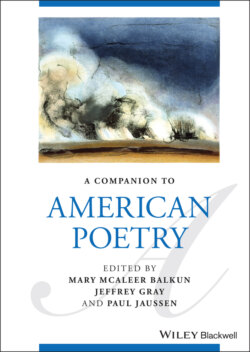Читать книгу A Companion to American Poetry - Группа авторов - Страница 17
3 Before Poetry: Revival Verse and Sermonic Address in Eighteenth-Century America
ОглавлениеWendy Raphael RobertsState University of New York at Albany
Verse abounded in eighteenth-century British North America. From almanacs to newspapers, from school notebooks to commonplace books, from letters to literary salons, from hymnbooks to broadsides, from sermons to plays, from religious revivals to taverns, from funerals to executions to barn dances, early American culture was saturated with poetry. Some poetry spread news, some entertained with fantastic and sensational accounts of travel or crime, some tantalized with local gossip, some urged moral reflection. Other poetry memorialized neighbors, loved ones, and events, or served as literary games to solidify friendships, romances, or social status. Some poetry activated and sustained new religious forms and communities; some measured intellectual capacity and served as litmus tests for civilizations. The forms, occasions, and uses of eighteenth-century poetry felt right to the people who lived with and through these vibrant verse practices, and they often had a very different sense of what made poetry good, or even what made poetry poetry than later generations of poets and scholars.
The notion of poetry itself as a distinct genre, as well as the proper way to read it, has been an open question for scholars of historic poetics. Virginia Jackson argues that the “lyricization of poetry” occurred unevenly over the course of the late eighteenth and early nineteenth centuries and effectively subsumed a whole field of verse genres into what we now recognize as lyric poetry—or simply poetry (2005). Reading lyrically rather than historically, she argues, eclipses the diverse verse forms that came before. Attending to the various forms, media, and communities in their specificity has helped early American scholars recuperate forgotten ways of reading and engaging with verse.
The many people who wrote, printed, declaimed, sang, and exchanged verse did so in a context in which poetry was widely considered crucial to politics and society. Much of eighteenth-century British North American poetry aimed to do things in the world not to earn the respect of posterity as a participant in a great literary tradition. Max Cavitch traces one of the most enduring occasional verse forms, the elegy, and reveals how mourning verse practices were essential to nation building (2007). Colin Wells shows how a vigorous political poetry, now largely forgotten, actively shaped political opinions and institutions during the American Revolution and early United States (2018). David Shields’s groundbreaking work on the centrality of manuscript poetry to early American culture argues that eighteenth-century poetry has been largely missing from accounts of American poetry because one of the primary verse forms of the period—belletristic poetry in manuscript—was deeply occasional and eschewed the goal of permanence (1997). It was an elite poetry that aspired to sociability and experiments in civility in a variety of private spaces such as taverns, coffee houses, salons, clubs, and fraternities.
All of these early American verse practices lived and intervened in the social (Cohen 2015). The poetry that appears exclusively religious was no different; in fact, the majority of the poetry that early British North American colonists read and wrote was religious. As scholars of religion have long recognized, religion does not inhabit a special space apart from the social; it is, in Émile Durkheim’s terms, the organization of the social. This essay turns to a prolific new verse culture that arose within the eighteenth century, which was explicitly religious and as such deeply enmeshed in arranging the social—revival poetics (Roberts 2020). Revival poetry encompassed a variety of verse forms and straddled later conceptions of hymn and poetry and piety and sociability that tend to be viewed as distinct. Protestant Christianity deeply influenced American poetry in a variety of ways; in this essay, I return to early evangelicalism to show how revival verse participated in the construction of what would become modern lyric’s address.
